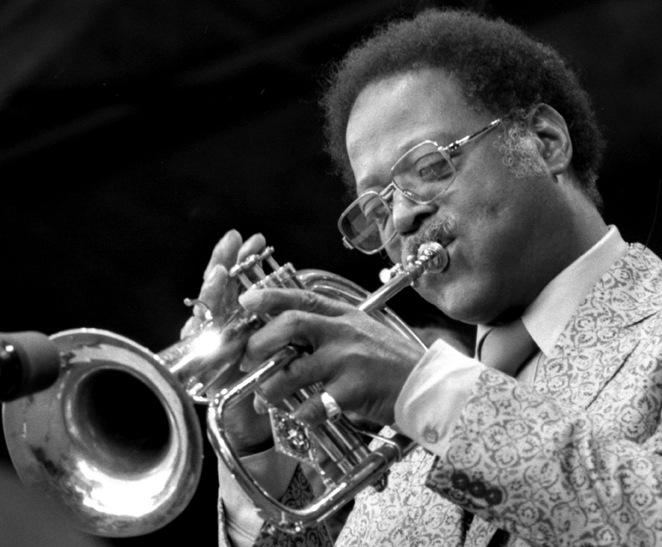
Clark Terry
Clark Virgil Terry Jr.[1] (December 14, 1920 – February 21, 2015)[2] was an American swing and bebop trumpeter, a pioneer of the flugelhorn in jazz, and a composer and educator.
Clark Terry
Clark Virgil Terry Jr.
February 21, 2015 (aged 94)
Pine Bluff, Arkansas, US
- Musician
- composer
- Trumpet
- flugelhorn
- vocals
1940s–2015
He played with Charlie Barnet (1947), Count Basie (1948–51),[3] Duke Ellington (1951–59),[3] Quincy Jones (1960), and Oscar Peterson (1964–96). He was with The Tonight Show Band on The Tonight Show from 1962 to 1972. His career in jazz spanned more than 70 years, during which he became one of the most recorded jazz musicians, appearing on over 900 recordings. Terry also mentored Quincy Jones, Miles Davis, Herbie Hancock, Wynton Marsalis, Pat Metheny, Dianne Reeves, and Terri Lyne Carrington.[4]
Big band era[edit]
Blending the St. Louis tone with contemporary styles, Terry's years with Basie and Ellington (who secretly recruited Terry away from Basie)[6] in the late 1940s and 1950s established his prominence. During his period with Ellington, he took part in many of the composer's suites and acquired a reputation for his wide range of styles (from swing to hard bop), technical proficiency, and good humor. Terry influenced musicians including Miles Davis and Quincy Jones, both of whom acknowledged Terry's influence during the early stages of their careers. Terry had informally taught Davis while they were still in St Louis,[7] and Jones during Terry's frequent visits to Seattle with the Count Basie Sextet.[8]
After leaving Ellington in 1959, Clark's international recognition soared when he accepted an offer from the National Broadcasting Company (NBC) to become a staff musician. He appeared for ten years on The Tonight Show as a member of the Tonight Show Band until 1972, first led by Skitch Henderson and later by Doc Severinsen, where his unique "mumbling" scat singing led to a hit with "Mumbles".[9] Terry was the first African American to become a regular in a band on a major US television network. He said later: "We had to be models, because I knew we were in a test.... We couldn't have a speck on our trousers. We couldn't have a wrinkle in the clothes. We couldn't have a dirty shirt."[10]
Clark has many relationships in the music world and they all speak highly of him. One of those relationships was Quincy Jones, who wrote the preface to Terry's autobiography. Jones led a band for the musical Free and Easy in 1959, and Terry left Duke Ellington Orchestra to join them in Belgium. [11]
Terry continued to play with musicians such as trombonist J. J. Johnson and pianist Oscar Peterson,[12] and led a group with valve-trombonist Bob Brookmeyer that achieved some success in the early 1960s. In February 1965, Brookmeyer and Terry appeared on BBC2's Jazz 625.[13] and in 1967, presented by Norman Granz, he was recorded at Poplar Town Hall, in the BBC series Jazz at the Philharmonic, alongside James Moody, Dizzy Gillespie, Coleman Hawkins, Benny Carter, Teddy Wilson, Bob Cranshaw, Louie Bellson and T-Bone Walker.[14]
In the 1970s, Terry concentrated increasingly on the flugelhorn, which he played with a full, ringing tone. In addition to his studio work and teaching at jazz workshops, Terry toured regularly in the 1980s with small groups (including Peterson's) and performed as the leader of his Big B-A-D Band (formed about 1970). After financial difficulties forced him to break up the Big B-A-D Band, he performed with bands such as the Unifour Jazz Ensemble. His humor and command of jazz trumpet styles are apparent in his "dialogues" with himself, on different instruments or on the same instrument, muted and unmuted.
Over 250 awards, medals and honors, including: